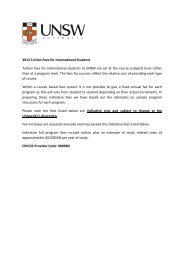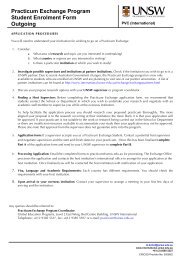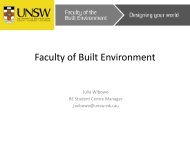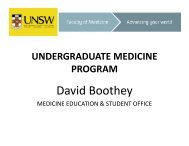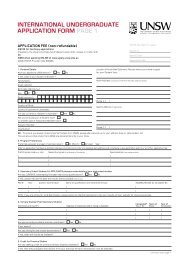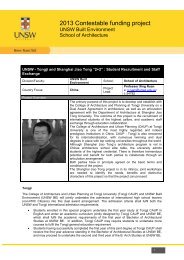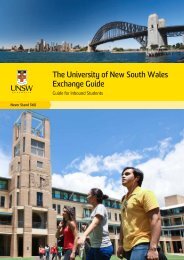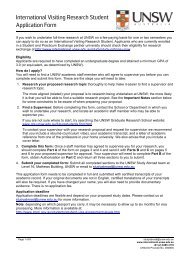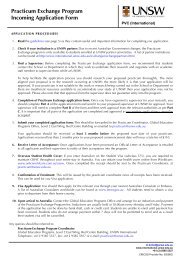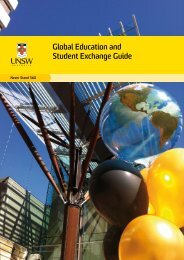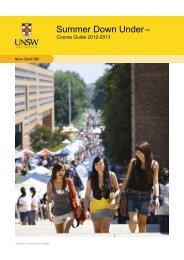undergraduate - UNSW International - The University of New South ...
undergraduate - UNSW International - The University of New South ...
undergraduate - UNSW International - The University of New South ...
You also want an ePaper? Increase the reach of your titles
YUMPU automatically turns print PDFs into web optimized ePapers that Google loves.
68 | <strong>UNSW</strong> <strong>International</strong> Undergraduate Guide 2011 | www.unsw.edu.auprogram information | SPhysical Oceanography/Meterology is concernedprimarily with the mathematical equations thatdescribe fluid flow and how these are used inunderstanding the ocean. It is also concerned withthe measurement, modelling and prediction <strong>of</strong>processes that form the world’s climate system.Physics is the study <strong>of</strong> the laws <strong>of</strong> nature that governthe behaviour <strong>of</strong> the universe. From the very smallestscales <strong>of</strong> sub-atomic particles to the very largest incosmology, it applies these laws to the solution <strong>of</strong>practical problems and the development <strong>of</strong> newtechnologies.Physiology is the study <strong>of</strong> how the normal bodysystems function in humans and animals. It examineslife processes and their consequences - from themolecular level through to the whole organism. Thisis one <strong>of</strong> the major foundations <strong>of</strong> medicine.Psychology is concerned with the scientific andsystematic study <strong>of</strong> the human mind and behaviour,in a wide variety <strong>of</strong> areas. It encompasses the study<strong>of</strong> cognitive, social, developmental, behavioural andphysiological processes.Safety Science applies physical, health andbehavioural sciences to the safety and well being <strong>of</strong>people in work and other activities. (This discipline iscurrently under review. For further information pleasecontact the Faculty <strong>of</strong> Science on sso@unsw.edu.au).Spatial Information Systems focuses on theintegrated approach <strong>of</strong> measurement, analysis,management, storage and display <strong>of</strong> the descriptionsand location <strong>of</strong> Earth-based data (spatial data). Thisdata comes from many sources, including earthorbitingsatellites, air and seaborne sensors andground-based instruments.Statistics is a fascinating science and art that usesquantitative data for modelling and inference.Its mathematical foundations are in the theory <strong>of</strong>probability and it works out how to estimate andmake decisions using knowledge that is uncertain orobservational material that is subject to error.Toxicology is the study <strong>of</strong> the adverse effects <strong>of</strong>chemicals on people and/or the environment, andthe means in which such adverse effects can beidentified, assessed and controlled. It is a blend<strong>of</strong> biological, chemical, safety and environmentalsciences. (This discipline is currently under review.For further information please contact the Faculty <strong>of</strong>Science on sso@unsw.edu.au).Vision Science deals with the mechanics <strong>of</strong> sight andincludes applied technology to help us see better.<strong>The</strong> program is designed to develop technologistsand scientists who can work in ophthalmic industriesto build better instruments and technologies forvision and vision based aspects <strong>of</strong> other industries.*<strong>The</strong>se study plans have to be combined with a minimumamount <strong>of</strong> science-based courses.MINOR SUBJECTS AVAILABLEIf students choose to study a minor, the minor maybe taken from another area <strong>of</strong> science or from theFaculties <strong>of</strong> Arts and Social Sciences, Engineering,Built Environment or the Australian School <strong>of</strong>Business.Combined ProgramsBachelor <strong>of</strong> Science/Bachelor <strong>of</strong> ArtsProgram code 3930FacultyScienceMin. years 4 yearsUOC (per year/total) 48/192Semester 2 entry Yes (may require summer sessionafter 1st semester)Est. first year tuition A$25,200Est. fee to complete A$114,160Assumed Knowledge Maths and Chemistry plus Biologyor Earth and Environmental Scienceor PhysicsOnline Handbook www.handbook.unsw.edu.au/<strong>undergraduate</strong>/programs/2010/3930.htmlWebsitewww.science.unsw.edu.auBachelor <strong>of</strong> Science/Bachelor <strong>of</strong> Social ScienceProgram code 3935FacultyScienceMin. years 4 yearsUOC (per year/total) 48/192Semester 2 entry Yes (may require summer sessionafter 1st semester)Est. first year tuition A$25,200Est. fee to complete A$114,160Assumed Knowledge Maths and Chemistry plus Biologyor Earth and Environmental Scienceor PhysicsOnline Handbook www.handbook.unsw.edu.au/<strong>undergraduate</strong>/programs/2010/3935.htmlWebsitewww.science.unsw.edu.auSEE ALSOBachelor <strong>of</strong> Commerce/Bachelor <strong>of</strong> Sciencepage 38Bachelor <strong>of</strong> Engineering (various programs)/Bachelor<strong>of</strong> Sciencepages 43-55Bachelor <strong>of</strong> Music/Bachelor <strong>of</strong> Sciencepage 65Bachelor <strong>of</strong> Music/Bachelor <strong>of</strong> Science (Advanced)page 65Bachelor <strong>of</strong> Science/Bachelor <strong>of</strong> Educationpage 42Bachelor <strong>of</strong> Science/Bachelor <strong>of</strong> Lawspage 61Advanced ScienceBachelor <strong>of</strong> Science (Advanced)Program code 3972FacultyScienceMin. years 4 yearsUOC (per year/total) 48/192Semester 2 entry Yes (may require summer semesterafter 1st semester)Est. first year tuition A$28,560Est. fee to complete A$129,040Assumed Knowledge Maths and Chemistry plus Biologyor Earth and Environmental Scienceor PhysicsOnline Handbook www.handbook.unsw.edu.au/<strong>undergraduate</strong>/programs/2010/3972.htmlWebsitewww.science.unsw.edu.auWhat is Advanced Science?Advanced Science degree programs provide achallenge to students with an interest in criticalthinking, research and innovation. Tailored specificallyfor talented students, these programs require fouryears <strong>of</strong> full-time study, including a research-basedyear <strong>of</strong> training leading to an Honours award.A wide choice <strong>of</strong> study plans, designed to meetspecific aims and objectives, is available. Moststudy plans are identified with a particular school ordiscipline (e.g. anatomy, chemistry). Depending onthe program <strong>of</strong> study, students in their fourth yearundertake either a research Honours program or aprogram <strong>of</strong> coursework and research. OutstandingHonours degree students may continue their studiesin a higher research degree.Study Plans In Advanced Science• Anatomy• Archaeology andPalaeoenvironments• Biochemistry• Biological Science• Biotechnology• Chemistry• Climate Science• Ecology• Genetics• Geosciences• Geochemistry• Marine and Coastal Studies• Mathematical Physics• Medical Microbiology and Immunology• Microbiology• Molecular Biology• Neuroscience• Pharmacology• Physical Oceanography• Physics• Physics and Astronomy• Physics and Computing• Physiology• Psychology• Vision ScienceBachelor <strong>of</strong> Science (Advanced Mathematics)Program code 3986FacultyScienceMin. years 4 yearsUOC (per year/total) 48/192Semester 2 entry Yes (may require summer semesterafter 1st semester)Est. first year tuition A$28,560Est. fee to complete A$129,040Assumed Knowledge MathsOnline Handbook www.handbook.unsw.edu.au/<strong>undergraduate</strong>/programs/2010/3986.htmlWebsitewww.maths.unsw.edu.auWhat is Advanced Mathematics?This program targets high achievers who wishto specialise in mathematics as a basis for theincreasing range <strong>of</strong> quantitative careers such asfinance, environmental modelling and research. <strong>The</strong>degree will allow students to focus on mathematicsto provide a comprehensive foundation in research.



